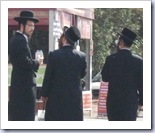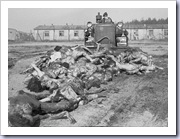“Noah was a perfect righteous man in his generation.” (Genesis 6:9)
 Arielle and Sophia had their inside arms and hands locked as they peered through their rain-muddied bedroom window.
Arielle and Sophia had their inside arms and hands locked as they peered through their rain-muddied bedroom window.
“I bet”, said Sophia, lifting her free hand to finger a tiny scratch on the splattered glass, “as everyone’s so sad about Noah, there’s even more rain in the house than there is outside.
“But I can still see the mark Mom thinks was left by the stork when he brought me home eight years ago. I wonder if tears leave stains, too.”
“Umm,” nodded Arielle, who was Noah’s twin sister and had just past her sixth birthday.
“There are also two bigger marks underneath, from when the stork came back with Noah and me in two baskets and they banged on the glass as he flew in. Dad says he made a really big noise and things have never been quiet since.”
“Until now. I can’t do anything ordinary. I just want to sit down and make my head empty. I feel bad all the time, like when I’m very sick.”
“Me, too,” said Arielle, coughing hard to stifle another wave of sobs. “This sounds funny. But I feel like Addy did when we sent her to the doll hospital. Sort of broken. But we can’t mend Noah. He’s not here.
“It wasn’t fair when we were split up at school. If I’d been with Noah, he would not have been hurt. I wouldn’t have let it happen. I would have looked after him. We weren’t only twins. We were best friends. But instead, I heard loads of screaming and felt eleven burning, shooting bangs all over me in the same places where Noah was killed.
“Do you know, Sophia, lots of things are made like twins? When I couldn’t sleep last night, I thought of the bits in our bodies which are made in twos.”
“Like eyes, ears, arms and all that?”
“Hmm. I think God wants us to have two of lots of things so when one bit’s not well, the other can do extra work.”
“I can help by being your extra bit if you like. Don’t forget, I’m also your best friend,” said Sophia, giving her sister a squeeze.
“I want to tell you I was a little ‘bit’ jealous when President Obama visited and took your picture of Mom smiling and put it in his pocket.”
“I like Mr Obama,” said Arielle. “He’s also really smiley. And I’ve got one more nice thing to remember about Noah.”
“What’s that?,” asked Sophia, as they shuffled, arms still linked, from the window to sit on the bed.
“Well, when I did get to sleep I had a dream which started with the rain. Then the sun came out and I saw Noah on a cloud which looked like a big boat on the sea.
“He was sort of in charge of a long line of children and a man there said, ‘Hey Noah, you’re such a good kid, I want you to look after the others.’ Then he grabbed a girl who looked like me and told Noah to hold her hand. 
“You’ll laugh when I say Noah started talking like a taco factory manager. But he wasn’t mean and didn’t boss people about. He just quietly put everyone in twos and asked them to follow him inside the boat.”
“Then what happened?”.
“I woke up crying. But for a second I felt sort of cosy as the dream was like everything was good. But,” added Arielle, “please don’t tell Mom, Dad or Michael about it. They won’t believe me. Let them find out when they meet Noah again for themselves in the sky. He’ll want them on the boat, too.”
“That won’t happen for a long time,” said Sophia. “But when it does, we’ll get Mom to make him a party.”
-----------
*** With sincerest condolences to the families of those murdered in the Sandy Hook Elementary School Massacre. – N.I.W.
Natalie Wood
(Copyright, Natalie Irene Wood – 21 December 2012)

















